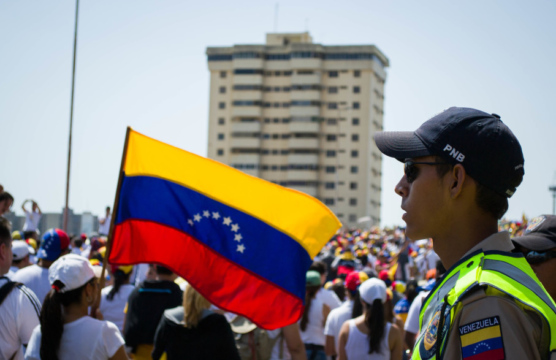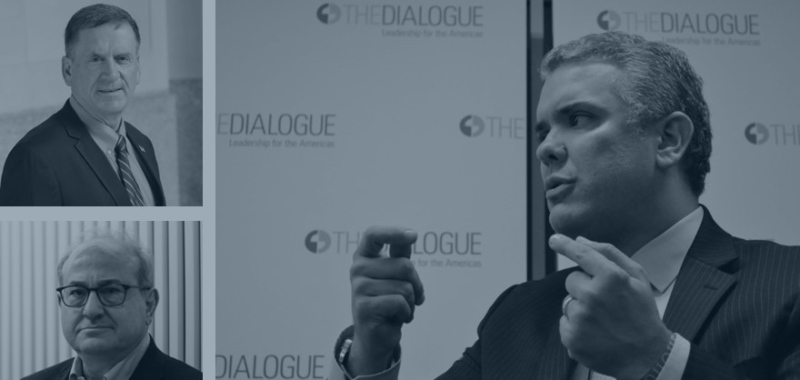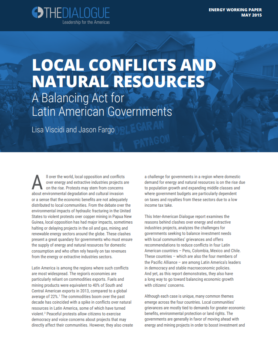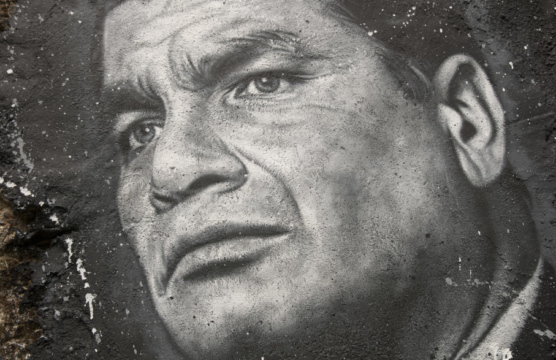
Venezuela Needs Its Neighbors
Events in the Ukraine have lifted the morale of anti-government protestors in Venezuela and elevated their expectations.
On May 27, 2021, the Inter-American Dialogue in collaboration with the Wilson Center held “A Conversation with Iván Duque Márquez, President of the Republic of Colombia,” hosting President Duque for a wide-ranging discussion on recent widespread street protests in the country and the government’s efforts to calm tensions through national dialogue with protest leaders and the country’s youth. The event featured opening remarks from Ambassador Mark Green, president, director, and CEO of the Woodrow Wilson International Center for Scholars, and closing remarks from Michael Shifter, president of the Dialogue, with both serving as moderators. The session began with a reflection on the Duque government’s response to the recent protests.
President Duque made clear the need to place the recent protests in context as issues that did not arise overnight, but rather a result of the many social debts that Colombia has accumulated over the years. He further explained that prior to his administration, Colombia underwent a stagnant economic growth of 1.7 percent and had a fiscal deficit of around 50 percent, which was only further exacerbated by the economic impact of the Covid-19 pandemic. Those most affected by the economic changes have been the youth, who represent most of those protesting. Therefore, as suggested by President Duque, the focus should be on providing opportunities for Colombian youth in the form of free public university education, job creation, and active youth participation in governmental decision-making processes.
In addition to the economic impact of Covid-19, Colombia has had to deal with the Venezuelan migrant and refugee crisis, leading to the promise of Temporary Protected Status (TPS) for Venezuelan refugees by the Duque administration. When asked how the international community could support Colombia managing the migration crisis, Duque emphasized the need of economic support as has been the case with the Syrian refugee crisis, which would allow the government to meet the financial needs of Venezuelan migrants and help close pre-existing social gaps in Colombia. In addition, he stated the need for both the capitalization of the Inter-American Development Bank and the strengthening of other multilateral organizations in order for them to play a more active role in post-pandemic recovery.
On US-Colombian relations, Duque believes the relationship between the United States and Colombia “has gotten to a mature level that has gone beyond the political cycles,” allowing for both countries to develop opportunities for investors. Duque suggested the United States should support Colombia by making sure American companies operating in Colombia hire young people, playing a larger role in the rollout of Covid-19 vaccines through the donation of 8 million vaccines, and including Colombia in nearshoring initiatives. On nearshoring, Duque mentioned it can “substantially be the next stage of an alliance with Latin America that will generate employment, trigger growth, reduce the pressure of the southern border, and allow more US companies to build aggregated value chains around the world.”
The event concluded with a Q&A session. Asked to give an update on the possible visit of the Organization of American States’ Human Right Commission regarding the excessive and unlawful use of force by police, Duque made clear that Colombia has been “committed to the protection of human rights, but [they] have always been transparent enough, so that [they] can have the scrutiny not only from the entities within the country but also from foreign entities.” Duque stated that the Colombian government is open to having any conversation with entities that protect human rights when based on an objective criterion. He reiterated that Colombia has continuously made human rights a top priority in the “training [of] all the academies in the army and the police.” He also addressed a question on the government's response to the deaths and injuries of protestors by stating there has to be an investigation on what has happened for both civilians and officers of the police and armed forces. He stressed that the Colombian government rejects any form of violence and always demands from the police and the military the highest human rights protection standards. As expressed by Duque, Colombia should “see this [moment] as a crisis, but also as an opportunity” for the creation of change for the country.
Events in the Ukraine have lifted the morale of anti-government protestors in Venezuela and elevated their expectations.
Conflicts over energy and natural resources are leading to social turmoil and posing serious challenges for investment projects all over Latin America.
Ecuadordan President Rafael Correa battles an increasingly dissatisfied citizenry as he implements fiscal reforms to counter dropping oil prices.


